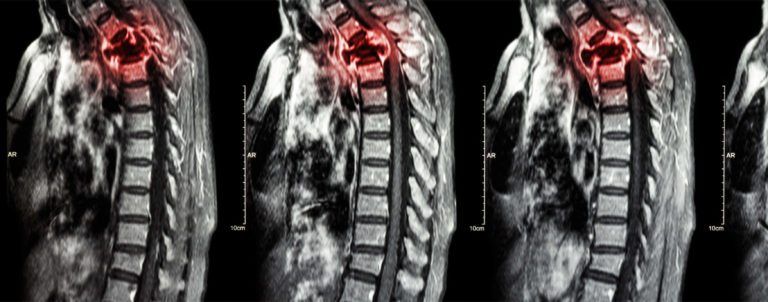Myelopathy

Have you been experiencing shooting pains or a numbness or tingling that radiates from your hands and arms? Do you find yourself having difficulty standing for long periods or pain localized to your neck? You may want to speak to your cervical surgeon, Dr. Peelle about testing for myelopathy. Myelopathy occurs when your spinal canal becomes narrow, a condition known as spinal stenosis, either through simple wear and tear, injury, or certain medical conditions. This compression of the spinal cord can cause the above symptoms, impacting your quality of life in ways from chronic pain and discomfort to being nearly debilitating.
Myelopathy can affect anyone, especially those who participate in associated risk behaviors that put additional strain on the spine such as athletic sports. Other potential contributing factors are physical trauma due to injury, being overweight, and in some patients, genetics can contribute. While open surgery used to be the only option for treating myelopathy, recent advances have made minimally invasive spinal surgery an option for many patients. If you think you may be suffering from myelopathy, speak to an orthopedic surgeon like Dr. Peelle and see what he advises.
FAQ:
1. What exactly is myelopathy?
Typically occurring in the cervical (neck) area of the spine, myelopathy refers to an ongoing spinal compression that can develop suddenly or gradually worsen over time. While myelopathy can occur in other regions of the spine, it is uncommon. The causes of myelopathy vary widely and may include simple causes such as bone spurs and discs suffering from herniation. Additional causes can include benign cysts, tumors, inflammation, and autoimmune disorders.
2. What are the symptoms of myelopathy?
Your spine protects the main thoroughfare of your bodies nervous system, and compression can result in a number of issues ranging from merely uncomfortable to acutely painful. Cervical myelopathy symptoms can include a feeling of heaviness in the legs, loss of fine motor skills, pain and numbness radiating through the arms and legs, and in some instances frequent and urgent needs to urinate.
3. What are my treatment options for myelopathy?
Your treatment needs to be discussed with Dr. Peelle to determine the proper approach for your particular case. In mild cases, the symptoms can be controlled through simple lifestyle changes, including periods of rest, and the use of hot and cold compresses on the affected area. More active methods involve the use of medication and physical therapy to help assuage the symptoms. In severe cases, spinal surgery may be necessary.
4. Is surgery necessary for myelopathy?
To determine if surgery is appropriate for your particular case of myelopathy, consult with Dr. Peelle. Typically surgery won’t be considered until all forms of non-invasive treatment have been attempted. In the event that surgery is deemed necessary, ask about a minimally invasive spinal surgery. Traditional surgery results in an overnight hospital stay, as well as long and often painful recovery times. Minimally invasive spinal surgery provides less painful, and shorter duration, recovery periods.

